Poverty


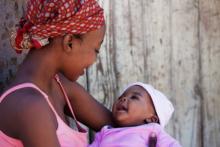
There are more than 220 million women in developing countries who don’t want to get pregnant, but who lack access to family planning information and contraceptives. Every year, nearly 300,000 of them will die during pregnancy or from complications giving birth. Far too many mothers will bury their babies before they even get to know the sound of their laughter. More than 2.6 million babies will be stillborn, and another 2.9 million will die before they are a month old.
Giving women the opportunity to time their pregnancies and space out their children through effective, low-cost contraception is key to turning around these heartbreaking numbers.







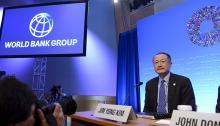
The World Bank is teaming up with global religious leaders in a 15-year effort to end extreme poverty by 2030.
About 35 religious groups worldwide, including Bread for the World, Islamic Relief International, the Religious Action Center of Reform Judaism, and Sojourners, endorsed the call to action. Supporters include Christians, Jews, Muslims, Baha’is, and others.
“Our approach to this staggering need must be holistic, rooted in the spiritual visions of our respective faiths, and built on a shared recognition of the intrinsic dignity and value of every life on Earth,” the call said.
Observers say it’s the first time the World Bank has tapped the reach and resources of religious groups in combating extreme poverty — partly out of a realization that the work is too big for any one institution, and also in hopes of limiting unnecessary duplication between the World Bank’s ideas and those of various religious groups.
“There’s a real convergence between these dual goals of the bank and many of the commitments and convictions of religious institutions and organizations,” said the Rev. Adam Taylor, a Sojourners and World Vision alum who now oversees faith-based initiatives at the World Bank.
During an April 9 teleconference, Wold Bank President Jim Yong Kim said the number of people living in extreme poverty — living on less than $1.25 per day — has fallen from 2 billion in 1990 to 1 billion today. And he strongly believes that with enough support, that figure could be eliminated in another 15 years.
But Kim said that in order to reach the goal, there will be two important aspects to the fight to end poverty: gathering evidence on what works and what doesn’t work in combating poverty, and enlisting the aid of religious communities.
“I believe that some of the most important leaders in the movement to end extreme poverty will be people of faith, people who are motivated fundamentally to help the most vulnerable among us,” Kim said.

For my privileged, perhaps overly comfortable children, something as trivial as our Internet being down constitutes a crisis. When we do our “gratitude inventory” (aka, a way to get them to reflect and pray), they rattle off things as a matter of routine that many people would only dream of.
So how do I explain something as alien and complex a state as being part of the working poor in a way they can have a at least a chance to internalize?
This was part of my goal in taking on My Jesus Project, a year-long endeavor to more deeply understand what we mean when we talk about following Jesus: to move from ignorance to empathy, which can only be achieved sometimes through direct, personal experiences.
For a month, I was assigned by one of my “Jesus Mentors” to go out of my way to walk and/or take public transportation to get places, with the intention that I would come into contact with people I might otherwise miss or overlook. As I did it, I realized my kids could benefit from it as well.
The first sign that they needed such an experience was that when I announced to them we were taking the bus and train to do our family activities one weekend, they were excited. It was a new experience for them, rather than a necessity. As for the mile-long walks to get from place to place when the transit system didn’t get us exactly where we were going — they were a little less thrilled with that. And yet, we slowed down more, spent more time talking, and while on the public systems, I noticed we looked each other in the eye a lot more, rather than all facing forward (with the kinds inevitably with their faces fixed on a screen) in the car.
My son, Mattias, who is on the high end of the autism spectrum, is a keen observer, and I suppose a natural byproduct of that is that he asks questions. A lot of questions.
“Dad,” he said, after jumping off the final leg of the bus route one day, “why were some of the people sleeping on the bus?”

Years ago as a child growing up in Cleveland, Ohio, I was befriended by a wonderful family around the corner from my home. The patriarch of the family, Edward Blunt Sr., was a hard-working executive for a telecommunication company; the matriarch, Roma Blunt, lovingly called Aunt Roma, was a consultant for several local educational institutions; and their son, Ed Jr., became one of my best friends and adopted brother.
Ed and I played sports, shared the same birthday, and graduated from high school and college together. Ed's family provided a unique gift for the young men in our neighborhood. As a result of their southern roots and deep-rooted village values, they believed adults — especially adults of African descent — had a responsibility to aid and assist in the development of young men in the community.
At least weekly, a gang of musty, sweaty, boisterous young men crowded into the Blunt household to take part in a ritual of culinary excellence provided by Aunt Roma. In this house we did not own, pay for, or live in, we witnessed the southern artistry and gastric creativity produced with a palette of collard greens, gumbo, cornbread, sweet potatoes, macaroni and cheese, fried okra, and fish on the canvas of our senses. The white house on Green Road became our hangout, respite, and my second home. Since I lived geographically closest to the Blunts’ home, I found myself at their address more frequently than other "brothers" in our network.
Upon one of my routine visits after finishing another amazing meal, Aunt Roma passed on a special gift. She handed me a key to the home. She stated with matter-of-fact ease, "Otis, you're over here enough, you might as well have a key."
After I said thank you, she began to reemphasize the rules of the house.
"You are always welcome here … you are welcome to eat, rest, and relax ... I trust you, and as long as you abide by the rules of the house and your parents are aware of where you are, this door is always open to you."
I was given access to the Blunts’ home because of my relationship with their son. I was given access to a home I did not create, build, or purchase. Because of my relationship with their son, I was given access to an environment I did not create.

The prophets’ preoccupation with justice and righteousness has its roots in a powerful awareness of injustice. That justice is a good thing, a fine goal, even a supreme ideal, is commonly accepted. What is lacking is a sense of the monstrosity of injustice. Moralists of all ages have been eloquent in singing the praises of virtue. The distinction of the prophets was in their remorseless unveiling of injustice and oppression, in their comprehension of social, political, and religious evils. —Abraham Joshua Heschel, The Prophets
Injustice anywhere is a threat to justice everywhere. We are caught in an inescapable network of mutuality, tied in a single garment of destiny. Whatever affects one directly, affects all indirectly. —Martin Luther King, Jr.
According to the U.S. Environmental Protection Agency, environmental justice is defined as:
The fair treatment and meaningful involvement of all people regardless of race, color, national origin, or income with respect to the development, implementation, and enforcement of environmental laws, regulations, and policies.
As we consider this definition, and look around our communities, do we find this fair treatment taking place? Are we aware of how economic and environmental decisions are made? Many times it can become so overwhelming that we think it best to leave it to the experts. Unfortunately, this can lead to exploitation, as discrimination typically takes place in poor and underserved communities where people may not understand their rights, or they choose not to fight back out of fear. As we dig deeper and the shackles are removed, we begin to see how economic and environmental justice are connected and how this exploitation is directly related to incentives like government funding, tax breaks, and land grabs that favor corporations over human beings and the environment. Does the end result benefit all God’s creation or just a wealthy few?


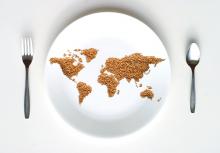
We have a vision.
End extreme poverty by the year 2030.
There has never been a time such as this. There has never been a time in human history where we have been more equipped to do more than just envision a world free of extreme poverty. The empirical evidence is there — extreme poverty can be ended within the next fifteen years.
But first, we must commit. As a global community we must act guided by the best evidence of what works and what doesn’t, and to use our voices to compel and challenge others to join us in this urgent cause inspired by our deepest spiritual values.
This is a historic opportunity. The goal to end extreme poverty by 2030 is now possible when it hasn’t really been before. But it will take all of us to accomplish it.
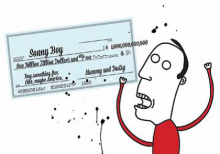
WITH THE NEXT election still almost 18 months away, you’d think the media would focus on more important topics in the meantime, such as where Kim Kardashian is spending her next vacation.
But you’d be wrong. It’s officially time for the press to ignore more newsworthy subjects in favor of endless coverage of the election “horse race,” but without the legendary good sense horses bring to such occasions.
ISIS on the move, taking the Middle East back to the 7th century? Forget that. Let’s talk about Jeb Bush’s 2016 run, although the hook could be how ISIS reminds people of the disastrous policies of the last Bush in the White House. Or was it the one before that? I can’t remember. (In hindsight, the Bush parents should have named alltheir sons George, so presidential ballots could be printed in bulk, enough for several elections.)
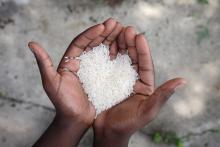
IT’S BEEN HALF a century since Lyndon Johnson declared a War on Poverty, and obviously this is a war that we still haven’t won. According to the Census Bureau, in 2013 there were still 45.3 million Americans living in poverty. That’s nearly 15 percent of the American people, including one in five children and one in three children of color.
Progress has been made on global poverty, with the proportion of people living in extreme poverty worldwide cut in half between 1990 and 2010, but the World Bank estimates that 1 billion people worldwide still live on less than $1.25 per day. Push that up to a mere $2 per day and the number is 2.2 billion people—almost a third of all the people on Earth.
I’ve always described the central fact of God’s economy as this: There is enough, if we share it. There’s no question that we have the resources to end poverty globally and domestically. What we lack are the moral resolve, the political will, and better strategies to make it happen. Yet those three may finally be coming together. I believe there are new confluences occurring that could be both helpful and hopeful.
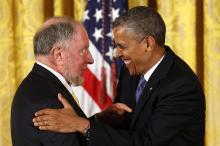
Harvard professor Robert Putnam jokingly calls himself “a nice Jewish formerly Methodist boy.”
But the public policy expert’s new book, Our Kids, reads more like a tent meeting revival, complete with an “altar call” at the end. His private meetings and public appearances at the White House and Capitol Hill, and meetings with civic and faith leaders across the country, carry the same fervor.
While evangelists convict people of their sinful ways and then convert them to the path of salvation for the hereafter, Putnam’s focus is more on this side of heaven.
His goal: to awaken and inspire Americans to “save” young people from a future trapped in a spiral of fractured families, poor schooling, and a grim economic future that Putnam says will cost taxpayers trillions of dollars. Trillions.
He is not only aiming for political, social, and religious elites. He’s also aiming at the everyday reader from Boston to Dubuque with a message that failure to act will “undermine democracy and political stability for all.” That’s why the book is subtitled, “The American Dream in Crisis.”
“I’m writing for ordinary people, not the political class. I’m holding up a mirror of American society to the ‘haves’ to say ‘look what we’ve become,’” he said.